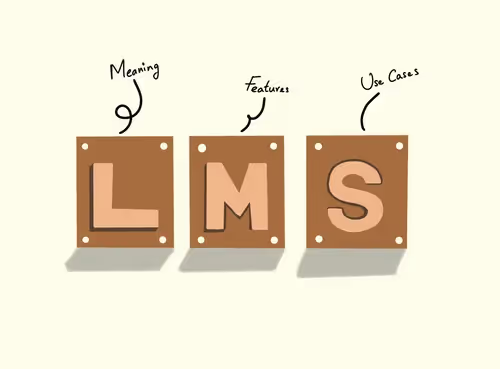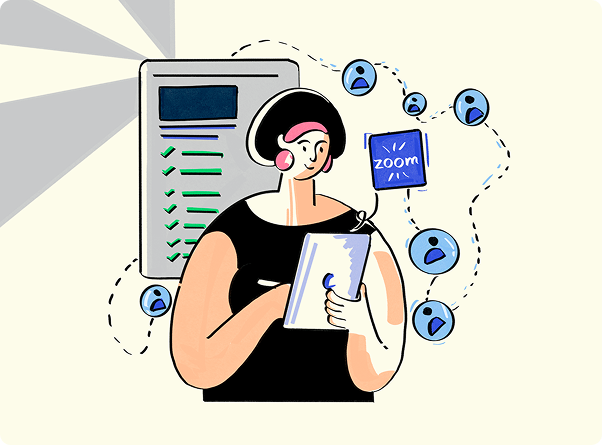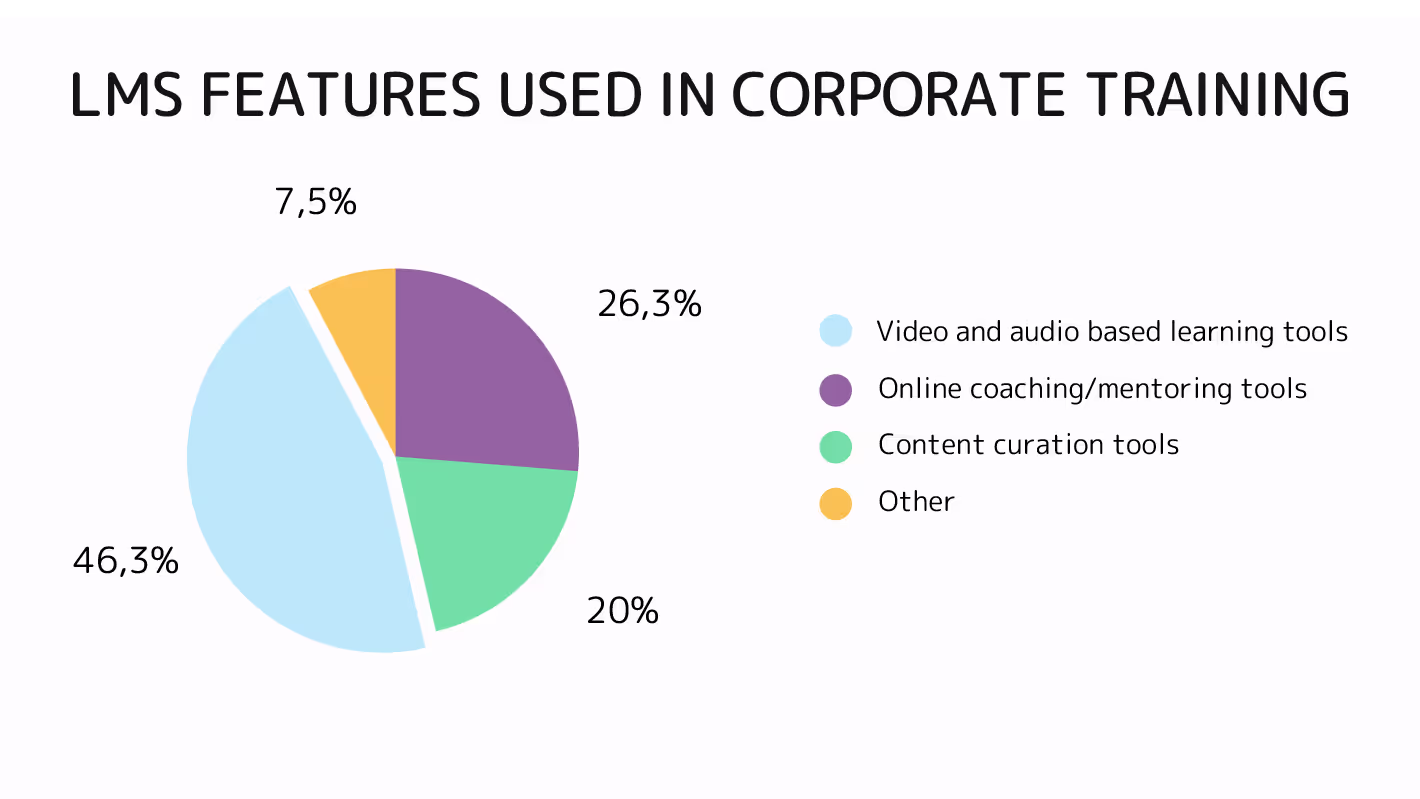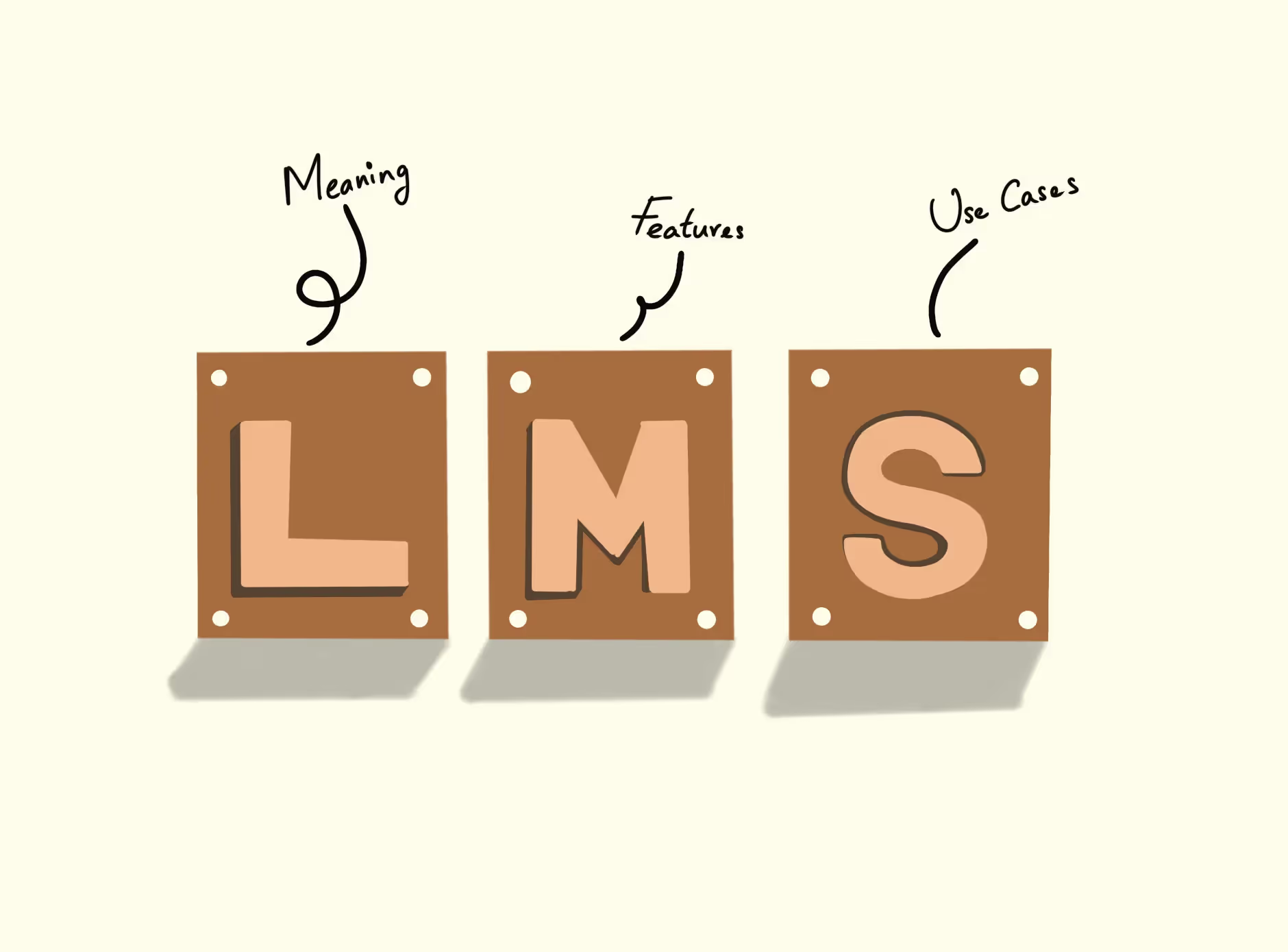


Key Takeaways
- Employee Onboarding: LMS streamlines global onboarding, reducing time and boosting new hire productivity and retention.
- Corporate Training: LMS offers flexible, on-demand training to enhance skills and monitor employee development.
- Higher Education: LMS provides online, flexible learning, enabling personalized education and real-time progress tracking.
Is an LMS Worth It? Absolutely!
Think about a scenario wherein training management, performance monitoring, and education advancement are less of a chore and more like getting a movie suggestion from Netflix. That is the beauty of the Learning Management System (LMS). An LMS is not just an application beneficial to the corporate trainer, the educator, or the business leader – it is a product that makes a difference.
Learning management systems encompass a range of possibilities, from registering and orienting new employees to delivering skill-based training courses with a single button.
But how exactly do organizations and educators make use of this powerhouse? The answer, again, is found in its versatility. In this blog post, we will list 10 innovative LMS use cases that clearly define the system’s potential and indicate that learning management systems are essential for the present and future.
What is an LMS and Why is It Essential for Modern Learning?
A Learning Management System (LMS) is a software solution or platform for the delivery, administration, reporting, and analytics of instructional material, training courses, materials, and education. This makes it easy for organizations, educators, and learners to connect in a central point. Learning management systems help educators create training programs, course management, employee skills enhancement, etc. that are essential in online learning.
Technology is changing the way through which knowledge is imparted and an LMS is a key catalyst of this change.
- For businesses, it helps to manage training programs, fill knowledge gaps, compliance, and enhance productivity among others.
- For education institutions, it produces effective and stimulating virtual classrooms that allow students to access course materials at their own pace.
As we face a new reality with extensive remote working and distance learning, an LMS is more of a necessity than a desirable addition.
For enterprises, LMS platforms not only improves learning outcomes but also reduces costs through automations and data analytics to gain insights into scalability.
10 Use Cases Of Learning Management System (LMS)
The best learning management system has opened up new opportunities for tailored education, corporate learning and training needs, and skill development. Explore the learning management system examples in this blog to uncover 10 unique LMS use cases that are shaping the future of learning.
1. Employee Onboarding Made Seamless
Consider a new employee in a global organization logging into their firm-specific onboarding customer training program from their first day on the job, learning corporate policies, job type, and team meetings all through the LMS.
The result? Shorter onboarding time and improved efficiency.
LMS centralize content pertaining to your onboarding programs - already formatted and ready-to-use.
A recent survey identified that businesses that have well-developed onboarding practices enhance their staff retention by 18%. An LMS guarantees that every new employee undergoes a uniform, educational, and effective on-the-job orientation that boosts their confidence and productivity right from the start.
2. Corporate Training on Autopilot

Whether it is leadership training soft skills or any technical training for up-skilling of the employees, an LMS enables organizations to deliver courses that can be attended at any time and any place.
For example, IBM’s LMS was used to deliver the AI skills program worldwide, saving over $200m in training and enhancing employee effectiveness. It signifies accomplishment and offers credentials, monitors development, and issues reports, which makes the workforce ready to capture opportunities in the current volatile global market.
3. Higher Education Transformed
Learning Management Systems (LMS) have revolutionized higher education by making learning more accessible, flexible, and engaging. With an LMS, universities and colleges can offer courses online, enabling students to access lessons and materials anytime, anywhere. This shift not only breaks down geographical barriers but also allows for personalized learning experiences.
Instructors can track progress, provide instant feedback, and adapt the curriculum to meet the diverse needs of students. With features like interactive content, collaboration tools, and automated grading, LMS platforms make the entire educational experience more streamlined, efficient, and effective for both students and educators.
4. Transforming SAT Prep with an LMS
A Learning Management System (LMS) is a game-changer for SAT preparation, providing unparalleled flexibility and efficiency. Unlike traditional test-prep tools that often restrict content customization and limit adaptability, an LMS empowers educators to create, modify, and manage test content seamlessly. It allows instructors to build tailored and personalized learning paths and experiences, customize question banks, and update lessons or tests in real time to meet diverse student needs effectively.
For instance, Franklin Yard, an SAT prep instructor, leveraged EdisonOS to overcome the limitations of pre-set content. With its robust question bank, Franklin ensured that no two students received the same questions repeatedly. The platform’s unique ability to repackage mock tests into sectional or skill-based practices allowed him to deliver personalized learning. By creating custom test templates and making real-time updates, Franklin transformed his teaching approach and boosted student performance significantly.
5. Realistic Test Simulations Made Simple
Creating realistic test simulations is essential for effective SAT preparation, yet many educators face challenges replicating the exact test environment. From limited access to tools like Blue Book to difficulties tracking student progress without personal login details, these gaps can hinder the learning experience.
A robust LMS like EdisonOS bridges these gaps by offering high-quality SAT practice questions that mimic real test conditions. Features such as hiding the clock, flagging questions, and using calculators provide a familiar test-taking environment, helping reduce student anxiety. With advanced score reports and analytics, educators can track performance seamlessly and identify areas for improvement—all without needing access to students' College Board accounts.
6. Compliance Training Made Easy
Compliance training becomes much easier and more effective with the right Learning Management System (LMS) in place. An LMS helps businesses deliver consistent, standardized training to employees, ensuring they meet regulatory requirements across all departments.
With automated tracking, companies can monitor employee progress and completion rates, ensuring no one falls behind. The system also allows for real-time updates to training materials, making it easier to stay current with changing laws and regulations. Data-driven insights provided by the LMS help identify areas for improvement and ensure that training programs are both comprehensive and efficient. This way, businesses can rest assured their compliance training programs are up-to-date, effective, and properly executed.
LMS platforms assist organizations in managing risks, and avoiding penalties and compliance issues while also ensuring corporate accountability through notifications and certification. Due to its design, it becomes easier and more effective in the delivery of compliance training.
7. Sales Enablement Like Never Before
An LMS is a powerful tool for enhancing sales enablement by providing a centralized platform for training, content delivery, and performance tracking. It ensures that sales teams are consistently equipped with up-to-date product knowledge, market insights, and effective selling techniques.
With features like interactive courses, on-demand access to training materials, and real-time updates, an LMS empowers sales representatives to learn at their own pace and stay aligned with organizational goals. This level of accessibility and employee engagement also translates into more confident and informed sales professionals who can drive better customer interactions.
Ultimately, an LMS streamlines the sales enablement process, boosts productivity, and equips teams to close deals more effectively.
8. Customer Training and Onboarding
An LMS isn’t just for internal use; it’s a great tool for customer success. For instance, SaaS organizations leverage LMS to facilitate training for their clients on how to use their software products. The company specializing in CRM, HubSpot, utilizes its own LMS for providing customers with onboarding or certification, thus ensuring they get the most from a product.
Such an approach helps to eliminate requests for customer support, enhancing users’ loyalty, and involving them in the value-creation process. This is because, once customers have the necessary knowledge regarding your product, they will be loyal and actively promote your brand.
9. Upskilling and Reskilling the Workforce
Technology advancement remains a key factor, and therefore upskilling becomes important in this generation. Integrated continuous learning by providing a collection of courses in such fields as AI, digital marketing, or data analysis when using an LMS. Some organizations such as Google employ their LMS to create awareness of new skills within the organization via courses offered and done at the employees’ own pace.
Things such as progress bars and certificates encourage learners to keep on evolving. Thus, an LMS investment ensures organizations prepare for the future, and keep high-performing employees with the company.
10. K-12 Education Beyond the Classroom
To teenage audiences, LMS social learning platforms improve the way multimedia, content management, and activity-based learning strategies are delivered. When the COVID-19 pandemic hit schools across the globe, the concept of LMS and social learning platforms was implemented to keep education going. Tools like Google Classroom also allowed the teachers to give assignments, and have online discussions, and they even demonstrated how to conduct experiments for their science classes.
It would be convenient for parents as they could monitor their child’s progress, and for students, education was very flexible. The following use case is a clear example of how LMS platforms are relevant in supporting education at any time.
11. Blended Learning for Training Providers
Those offering training in the form of workshops, certifications, and the like will be advantaged when they incorporate face-to-face training with online training. LMS enables them to keep track of time, and attendance and share documents and training materials, to give external training to supplement the classroom work. For instance, a language training center could use the LMS to provide extra grammar exercises and instructional videos.
What makes this approach even more effective is that it also saves time and because all the content is stored electronically, learners can revisit them anytime boosting the retention rates.
12. Freelancers and Solopreneurs Sharing Expertise
Under this category of users, freelancers and solopreneurs can take advantage of the LMS platforms to offer content in packaged form. For example, a professional working as a graphic designer could develop an online course that covers all different aspects of working with Adobe Illustrator.
Santosh Randive, a stock market trainer, credits EdisonOS for helping him run his courses smoothly and efficiently. The platform’s support has allowed him to deliver top-notch training and achieve great results. With EdisonOS, Santosh has truly experienced the potential of his expertise.
This makes learning accessible to everyone and creates an opportunity for professionals to scale up their knowledge and generate sources of passive income while the learners acquire needed skills. This is purely a win-win situation and is already changing how we exchange knowledge.
Real-World LMS Success Stories: How Top Brands Are Redefining Learning
Here are five real-life examples of organizations that effectively utilized LMS platforms to achieve remarkable outcomes:
Harish Kumar’s Winning Move: Transforming Chess Coaching with EdisonOS
Harish Kumar, a passionate chess coach, found his perfect partner in EdisonOS to take his coaching to the next level. Over the past two years, the platform has empowered him to create multiple courses and conduct live sessions with ease and efficiency on mobile devices. The seamless integration of tools allowed him to deliver interactive, engaging, and structured lessons to his students.
By leveraging EdisonOS, Harish not only expanded his reach but also enhanced the learning experience for his students, fostering a new generation of skilled chess players. Whether it’s course creation or live training, EdisonOS has become his go-to learning solution, for all his educational needs.
IBM: Reducing Training Costs While Boosting Global Workforce Skills
It was hard for IBM to ensure that its employees stay up-to-date on new technologies such as AI and cloud computing. To this effect, IBM embraced an LMS to develop an AI and cloud based skills training plan across the world.
This platform allowed employees to learn flexibly based on their wishes and used accessible and self-paced course modules in which employees could develop their knowledge of AI and practice it according to their preferences of a location or time zone.
About the lesson: Employees could watch the video, complete the tasks on the same page, and take a quiz. With the use of analytics, IBM was able to track how the program was faring and where learners were having difficulties, support was provided to close those gaps.
The result? IBM claimed large training cost reductions of $200 million/year while enhancing staff expertise in emerging technologies. This action not only ensured IBM had a skilled population to draw from in the future but also placed it strategically in leadership regarding innovation in the tech sector.
Duolingo: Gamifying K-12 Language Learning
Duolingo's approach to its language classes in school changed with LMS adoption - brough a whole new level of playfulness. Duolingo, gamified learning through features such as badges, taking streaks days of learning, and friendly competitive charts.
During the Corona pandemic, many schools adopted Duolingo’s “Duolingo for Schools” which enables teachers to assign lessons and monitor learners’ progress.
For instance, a teacher from California observed improved participation by 20% after adding Duolingo into her classroom. The availability of the platform on smartphones, coupled with the learning algorithms used by the platform enabled students to remain motivated whether they were in class or under the stay-at-home circumstances.
Through integrating both effective classroom models and available technology, Duolingo shows that LMS platforms can indeed reform the way education is delivered, and for learners of the younger generations.
McDonald’s: Onboarding Thousands of Employees with Ease
Since the company attracts a large pool of applicants, McDonald was a company that struggled to ensure excellence in training new employees. So the company created the Archways to Opportunity LMS to quickly train newcomers, enhance quality at scale and standardize training across thousands of stores.
New employees are trained on the firm’s ethical standards, safety measures, communication and service delivery, and business processes through interactive video tutorials, quizzes, and microlearning/role-play scenarios.
Using the LMS helps the managers also to monitor the progress of the learners and their performance to give them feedback where necessary. This way, McDonald’s was able to cut down training time and made its employees more job-ready without hampering service quality across its stores worldwide.
Harvard University: Bringing Ivy League Education Online
Harvard University faced the challenge of reaching a global, geographically dispersed audience while meeting the growing demand for flexible and scalable learning solutions. The traditional on-campus model limited accessibility, and the rise of online education highlighted the need for technological adaptation to remain competitive.
To address these challenges and expand its impact, Harvard adopted an open source LMS, through Harvard Online and partnered with edX, enabling it to deliver high-quality, flexible, and accessible education worldwide.
Students get to watch recorded lectures from seasoned professors, interact in discussion forums, and do assignments that simulate the face-to-face experience. For example, workers in India and Africa take Harvard University’s online business analytics course to acquire knowledge, skills, and certificates that advance their careers while they remain in their countries without visiting the United States.
The LMS also comprises intelligent solutions that provide smart course recommendations according to the learners’ progress and preferences to enhance learning experience and enhance user retention.
How EdisonOS Empowered My2tor to Boost SAT Success by 200 Points
Tina Wiles, CEO of My2tor, discovered a game-changing partner in EdisonOS to transform her tutoring services. Inspired by the effectiveness of Bluebook, EdisonOS became the backbone of her SAT preparation programs, offering tailored tools that helped students overcome test anxiety.
With EdisonOS’s user-friendly interface and robust features, Tina crafted engaging learning experiences that fostered confidence and precision, ultimately boosting student SAT scores by an impressive 200 points.
What sets EdisonOS apart for My2tor is its advanced data tracking, unparalleled flexibility, and prompt responsiveness. These features not only streamlined Tina’s teaching processes but also allowed her to focus on delivering impactful results. For any educator aiming to elevate their students’ performance, Tina gives EdisonOS a glowing five-star recommendation.
Exploiting the Possibilities of the LMS for Your Organization
A robust Learning Management System (LMS) is a versatile tool that can transform how organizations and educational institutions deliver knowledge. From course management, employee training and student education to compliance and global knowledge sharing, an LMS can cater to diverse needs while enhancing outcomes and efficiency.
Here’s how the right LMS can make a difference:
- Boost Learning Outcomes: Provide structured and engaging content for better comprehension and retention.
- Streamline Management: Simplify administration, tracking, and reporting for seamless operations.
- Enhance Learning Experiences: Foster interactive and meaningful learning journeys for students and trainees.
Ready to see the impact firsthand? Book a free demo with EdisonOS today and discover how it can be tailored to your unique requirements!












.png)
.webp)
